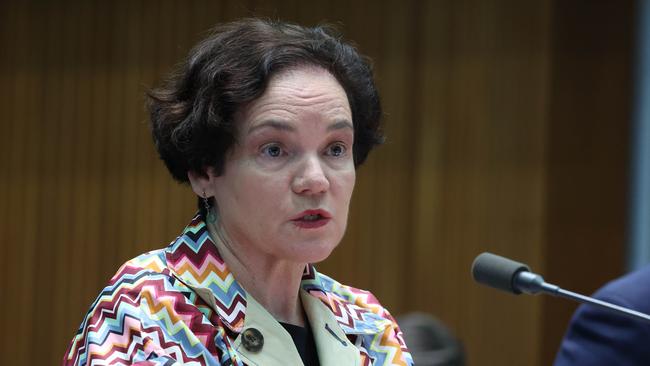Robodebt bureaucrat Kathryn Campbell resigns from $900,000 Defence job
Senior public servant Kathryn Campbell finished in her role last Friday after the Robodebt royal commission made damning findings against her.

Senior public servant Kathryn Campbell has resigned from her $900,000 Defence job, effective as of last Friday, after the Robodebt royal commission made damning findings against her.
In a short statement posted online on Monday, Defence said: “Defence can confirm it has accepted Ms Kathryn Campbell’s resignation from the department with effect from Friday, 21 July, 2023.
“Defence will not provide further comment on this matter.”
Anthony Albanese confirmed last week his department had suspended Ms Campbell without pay.
Her future in the public service had been in doubt for weeks in the wake of the royal commission report, which found she failed to act on advice that the scheme was unlawful.
Ms Campbell, Department of Human Services secretary in 2011-17 and Social Services secretary in 2017-21, was moved into a job advising on the AUKUS agreement weeks before she was dumped from her one-year role as Department of Foreign Affairs and Trade secretary.
Government Services Minister Bill Shorten said of Ms Campbell’s resignation: “I’m not interested in commenting about individuals who were behind Robodebt, I only care about the hundreds of thousands of innocent people who were victims of the insidious scheme.”
Defence Minister Richard Marles declined to comment.
The royal commission report contained a sealed section – which Mr Shorten says will eventually be made public – that referred individuals for both civil and criminal prosecution to agencies including the Australian Federal Police, the Australian Public Service Commission, the National Anti-Corruption Commission and the president of the Law Society of the ACT.
Department and agency heads have either referred or are referring public servants named in the sealed section to the APSC.
Former public service commissioner Steve Sedgwick has been appointed independent reviewer and will determine whether any referred public servant has breached the Australian public service code of conduct.
Public Service Minister Katy Gallagher said processes were under way to ensure that, where appropriate, people were held accountable for their actions.
“It’s early days. I’m hopeful that that won’t take too long to resolve but the work is under way and it’s a real priority for the Public Service Commission,” she told the Guardian Australian Politics podcast at the weekend.
The royal commission found Ms Campbell “did nothing of substance” when she learned the Robodebt scheme’s use of income averaging to pursue welfare recipients over purported debts was unlawful.
“When exposed to information that brought to light the illegality of income averaging, she did nothing of substance,” the report said. “When presented with opportunities to obtain advice on the lawfulness of that practice, she failed to act.”
It found this was because she knew the government could not achieve its intended savings without income averaging.
The Prime Minister attacked the scheme following the royal commission report as a “gross betrayal and human tragedy”.
At its peak, the scheme was sending out 20,000 debt collecting notices a week based on incorrect calculations from averaged Australian Taxation Office income data.
The royal commission found a number of people pursued for debts through the Robodebt scheme died by suicide.
Royal commissioner Catherine Holmes was highly critical of senior public servants involved in administering the scheme.
“It is remarkable how little interest there seems to have been in ensuring the scheme’s legality, how rushed its implementation was, how little thought was given to how it would affect welfare recipients,” she said in her report.




